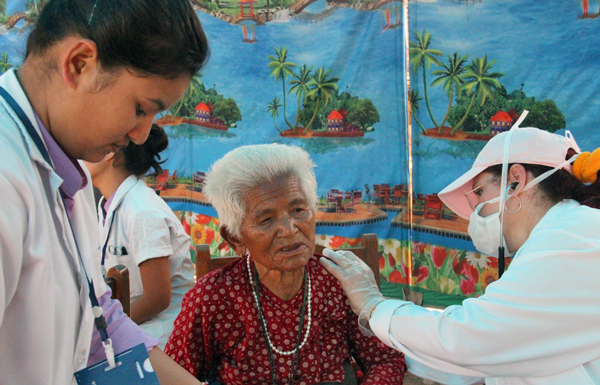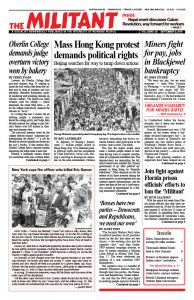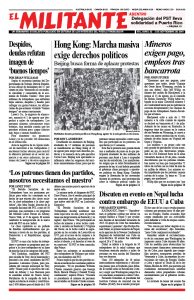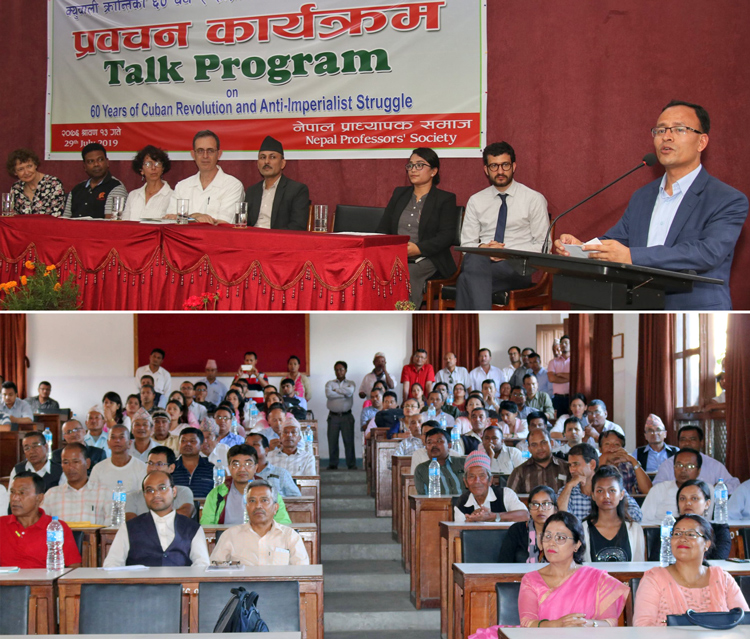BHAKTAPUR, Nepal — July 29 was a packed day of political and cultural activities in this historic city for a group of delegates who had just participated in a regional Cuba solidarity conference in Kathmandu, Nepal’s capital. Highlights of the visit included a tour of Bhaktapur’s ancient city center, learning about the exemplary role of Cuban internationalist doctors here after the 2015 earthquake, and speaking at a public meeting of 150.
Following the Ninth Asia-Pacific Regional Conference in Solidarity with Cuba held in Kathmandu (see report in last week’s Militant), five delegates visited nearby Bhaktapur at the invitation of the Cuba Solidarity Committee Nepal (CSCN) and the Nepal Workers and Peasants Party (NWPP). Leaders of these organizations had previously met some of them at international Cuba solidarity conferences in Sri Lanka in 2012 and Bangladesh in 2014.
Surendra Raj Gosai, president of the CSCN, welcomed Janet Roth and Annalucia Vermunt from the Communist League in New Zealand, Baskaran Appu from the Communist League in Australia and Samir Hazboun and Martín Koppel from the Socialist Workers Party in the United States.
Over the years the Cuba Solidarity Committee Nepal has exchanged information with these parties as part of the effort to tell the truth about the Cuban Revolution. Its magazine translated into Nepali several Militant articles on the fight to free five Cuban revolutionaries imprisoned in the United States, while the Militant published photos of protests in Nepal in defense of the Five.
The theme of the July 29 event here was “60 Years of the Cuban Revolution and Anti-Imperialist Struggle.” Held at the Khwopa Engineering College it attracted university professors, high school teachers, students, workers and farmers. The presentations were given in English with translation to Nepali.

“The Cuban Revolution is a paradigm of resilience against imperialism, not only in the Western Hemisphere but in the whole world,” said Subeg Bijukchhen of the Nepal Professors’ Society, which sponsored the program.
Srijana Sainju, a deputy representing the Nepal Workers and Peasants Party in the provincial parliament, called on the U.S. government “to stop its economic war against Cuba, economic war against the Democratic People’s Republic of Korea, interventions in Venezuela, invasion in Syria and other war-provoking activities in different parts of the world.”
Martín Koppel described how the living and working conditions of workers and farmers in the U.S. have sharply declined over the past three decades and pointed to struggles working people are organizing to defend themselves. Today, he said, “we face a global capitalist crisis of the kind none of us have ever lived through. In every country the ruling class is making us pay for this crisis. Sharper struggles are inevitable, including in the U.S.”
A revolutionary workers party must be forged in struggle to lead working people to take state power, Koppel said. “That’s why we point to the example of Cuba’s socialist revolution.” He described how SWP members join union and other social struggles and introduce the party and its program to fellow workers they meet campaigning in cities, towns and rural areas.
For working people in New Zealand the Cuban Revolution represents an example of the way forward too, Annalucia Vermunt, Communist League candidate for mayor of Auckland, told the meeting.
She noted that the government there is deploying troops in Afghanistan and Iraq alongside other imperialist powers. And she pointed to assaults on working people at home, including government moves to curb democratic rights after the murder of 50 Muslim worshippers by a gunman in Christchurch in March.
She described an ongoing fight led by Maoris, which CL members have joined, to stop the commercial development of land at Ihumatao, an area with important cultural significance for the indigenous Maori people.
Gosai, who like Sainju is a provincial parliamentary deputy for the Nepal Workers and Peasants Party, concluded the program by explaining the value of such political exchanges to strengthen common work by anti-imperialist fighters.
Audience members eagerly bought copies of the Militant and all 45 books on revolutionary working-class politics that SWP and CL members displayed, including topics from the Cuban Revolution to the class struggle in the U.S. to Russian revolutionary leaders V.I. Lenin and Leon Trotsky.
Earlier that day, Gosai and other NWPP leaders accompanied the visiting communist workers on a tour of Bhaktapur’s historic city center, two municipal colleges and a health center. They met with Narayan Man Bijukchhen, longtime chairman of the NWPP, which heads the municipal government. He described some of the history of peasant and other struggles in Bhaktapur, an area where the large majority of the population is Newar, one of Nepal’s national minorities.
Cuban volunteers
Our hosts showed us the progress being made in restoring ancient temples and other historic sites damaged by the 2015 earthquake. They also described the solidarity Nepalis received in the wake of this disaster from a brigade of 50 Cuban volunteer doctors and health workers, who treated nearly 20,000 people across Nepal. The earthquake left nearly 9,000 dead and 2.8 million displaced from their homes.
In Bhaktapur, the Cuba Solidarity Committee organized health camps at schools where Cuban teams set up improvised operating centers. Naresh Khatri, co-chair of the Engineers’ Society of Nepal, explained that Cuban health workers not only treated minor wounds but performed major operations, including for spinal injuries. Nepal, which faces a legacy of capitalist underdevelopment, lacks hospital facilities for some of these procedures.
“My father got surgery on his knee,” said Khatri. “Because of the language barriers, we and the Cubans sometimes had to communicate by sign language, but we managed.”
“There were long queues at all the medical centers to see the Cuban doctors,” said Gosai. They won the trust of working people “not only because of their outstanding work, but because of how they treated people with respect.”
Janet Roth contributed to this article.


